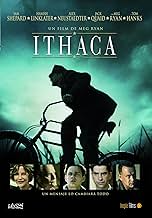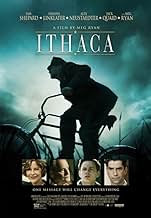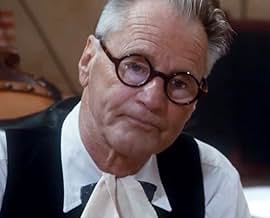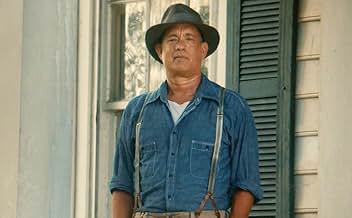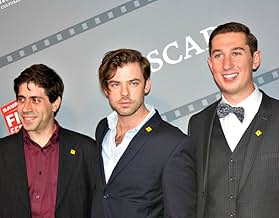PUNTUACIÓN EN IMDb
5,5/10
3,3 mil
TU PUNTUACIÓN
Homer Macauley, mensajero de telegramas, cumple 18 años en el verano de 1942 mientras su hermano mayor está en la guerra.Homer Macauley, mensajero de telegramas, cumple 18 años en el verano de 1942 mientras su hermano mayor está en la guerra.Homer Macauley, mensajero de telegramas, cumple 18 años en el verano de 1942 mientras su hermano mayor está en la guerra.
- Dirección
- Guión
- Reparto principal
- Premios
- 2 nominaciones en total
Reseñas destacadas
This film tells the story of a fourteen year old boy, who takes up the job as a messenger to deliver telegraphs back in the dark times of the second world war.
The book might have been touching, but this film unfortunately does not work. The story does not seen to go anywhere. It doesn't develop the characters, and viewers don't understand why any of the characters are at the point that they are at. Why does the boy need to take up a job? Why does the older guy drink so much? What about the other messenger? The lack of background information makes me feel distant from the characters.
It takes forty minutes of screen time to deliver the second telegraph. That's way too long for a film about a boy delivering telegraphs. The film could have explored more on how the sad telegraphs affected him, so there's wasted opportunity. I watched the film for Tom Hanks, and I don't even recall him having said a word!
The book might have been touching, but this film unfortunately does not work. The story does not seen to go anywhere. It doesn't develop the characters, and viewers don't understand why any of the characters are at the point that they are at. Why does the boy need to take up a job? Why does the older guy drink so much? What about the other messenger? The lack of background information makes me feel distant from the characters.
It takes forty minutes of screen time to deliver the second telegraph. That's way too long for a film about a boy delivering telegraphs. The film could have explored more on how the sad telegraphs affected him, so there's wasted opportunity. I watched the film for Tom Hanks, and I don't even recall him having said a word!
It is a film deserving to be loved. This is the main certitude about it. It deserve be loved for the beautiful portrait of mister Grogan proposed by Sam Shepart. For lovely young Spencer Howell. For the hard ( and good ) work of Alex Neustaedter. And, obvious, for Meg Ryan . Yes, it is not the most convincing movie about war. No doubts, it is a sketch only. The mother, performed by Meg Ryan remains a silhouette, unfortunately. But, honest to be, it represents more, more than a good try. It is a film to remind small, fundamental things defining us. From the connections between siblings to the maturity of a 14 years old age boy. From friendship to the telegrams, death, war and change of everything just in a minute. Its sins - many, maybe. Its basic virtue - an admirable delicacy for I am profound grateful to Meg Ryan.
Meg Ryan did an awesome job directing this movie. I was pleasantly surprised by the characters, the cinematography, lighting and superb story line. So many movies are predictable with the same dramas, with the same cliches while this one had a fresh approach. The feeling of the small town with divisions, logistics of war, the telegraph business of the time, the youth becoming an adult in ways so different than most films was captured with beautiful motion. The actors had real approach, timing and freshness. All in all, a wonderful movie.
I would caution the reader to not take too much stock in the less- than-stellar, Monday morning director, critical reviews of this film. Tom Hanks' position in the billing should be the very last, if even noted. His face time in this movie is probably less than 2 minutes total and, for all intents and purposes, Meg Ryan's character is minor. Any decent character actress could have played her role without any impact on the motion picture as a whole. This is not "Sleepless In Seattle" nor is it a spin-off of any other Meg Ryan or Tom Hanks movie. These two "box office draws" are in this motion picture because as producer (Hanks) and director (Ryan) they chose to be; perhaps for the purpose of giving this film initial gravitas or simply because they wanted to be participants in the telling of a good story and a good story this is.
This is a time-period piece conceived by William Saroyan in 1942 and published as the novel, "The Human Comedy" in 1943. Everything about this film is 1942 perhaps with the exception of the lack of recognizable, vintage 1940's music. This is a film depicting the morals and values of small town America at the beginning of the Second World War, not the values, morals, or expectations of those of us trapped so much in the present that we cannot recognize or even acknowledge the simple and far more innocent times portrayed in this film. Consequently, the gratuitous profanity so common in pictures today is refreshingly absent. This was a time when to be able to kiss a cute girl on her cheek was considered something very special to a young man heading off to war. It was a time when a little boy could get lost in town and the only real threat was that he might miss dinner. People did not lock their doors. A telegraph messenger, even though a stranger, was invited into one's home. If a person was involved in a nefarious or unseemly behavior they did their best to hide it. It was a time when a typical 14 year-old boy, like Homer Macauley (Alex Neustaedter), having experienced the Great Depression first hand, was already a responsible individual.
This was the world in which Homer rode his bicycle, delivering telegrams, picking up night letters, and doing everything he could to see that the Postal Telegraph Company could effectively compete with Western Union; all the while being the one remaining "man of the house" in the wake of his father's untimely death and his older brother's departure for service overseas. Ithaca and the nation were slowly adjusting to war as the patriotic zeal following Pearl Harbor gave way to the more sobering realities of life during wartime. The presence of a telegraph messenger at the front door was not yet perceived as a sign of bad news but those in the telegraph business, transmitting, decoding, and delivering the messages, were becoming keenly aware of the war's growing, painful impact on families. In this context, with the war's presence being increasingly felt and experienced, the small day-to-day aspects of community were the constants, giving the character of Homer's 4-year old brother, Ulysses (Spencer Howell), the unique ability to provide an endearing presence of those things that are ultimately important and reminding us that, even when things appear to be going so very badly, life is good and must go on.
Screenwriter Erik Jendresen says in his synopsis of the story line, "this is a coming-of-age story." In my view it is far more than that if, in watching the film, one will allow being transported to Ithaca, NY in 1942 and to embrace for 90 minutes or so, the values of the people living through this story at that time.
This is a time-period piece conceived by William Saroyan in 1942 and published as the novel, "The Human Comedy" in 1943. Everything about this film is 1942 perhaps with the exception of the lack of recognizable, vintage 1940's music. This is a film depicting the morals and values of small town America at the beginning of the Second World War, not the values, morals, or expectations of those of us trapped so much in the present that we cannot recognize or even acknowledge the simple and far more innocent times portrayed in this film. Consequently, the gratuitous profanity so common in pictures today is refreshingly absent. This was a time when to be able to kiss a cute girl on her cheek was considered something very special to a young man heading off to war. It was a time when a little boy could get lost in town and the only real threat was that he might miss dinner. People did not lock their doors. A telegraph messenger, even though a stranger, was invited into one's home. If a person was involved in a nefarious or unseemly behavior they did their best to hide it. It was a time when a typical 14 year-old boy, like Homer Macauley (Alex Neustaedter), having experienced the Great Depression first hand, was already a responsible individual.
This was the world in which Homer rode his bicycle, delivering telegrams, picking up night letters, and doing everything he could to see that the Postal Telegraph Company could effectively compete with Western Union; all the while being the one remaining "man of the house" in the wake of his father's untimely death and his older brother's departure for service overseas. Ithaca and the nation were slowly adjusting to war as the patriotic zeal following Pearl Harbor gave way to the more sobering realities of life during wartime. The presence of a telegraph messenger at the front door was not yet perceived as a sign of bad news but those in the telegraph business, transmitting, decoding, and delivering the messages, were becoming keenly aware of the war's growing, painful impact on families. In this context, with the war's presence being increasingly felt and experienced, the small day-to-day aspects of community were the constants, giving the character of Homer's 4-year old brother, Ulysses (Spencer Howell), the unique ability to provide an endearing presence of those things that are ultimately important and reminding us that, even when things appear to be going so very badly, life is good and must go on.
Screenwriter Erik Jendresen says in his synopsis of the story line, "this is a coming-of-age story." In my view it is far more than that if, in watching the film, one will allow being transported to Ithaca, NY in 1942 and to embrace for 90 minutes or so, the values of the people living through this story at that time.
"I don't know what's ahead, but whatever it is I am humbly ready for it." Homer Macauley (Neustaedter) has just watched his brother go off to fight in WWII and wants to do anything he can to help. He decides the best way for him to help his family is to get a job. He decides to become a bicycle telegraph messenger, and sets out to be the best and fastest one anyone has ever seen. Soon after he begins he is given a message that changes everything, and his job becomes more important than he ever imagined. This is a movie that I am very torn about. On one hand the movie has tremendous heart and leaves you hoping the movie won't end the way you expect it to. The acting is great and this is a very good character study of how the war affected the relatives stateside. On the other hand, you have a prediction on how the movie will end and you are just waiting for it to come to fruition. The fact that you think this way distracts you from the movie and the emotion of every other aspect seems to be lost and glossed over. I didn't think the movie was that bad and it is worth seeing, but about a year ago a movie called Little Boy came out and that was far better than this one. Overall, a good movie that is worth seeing, but you spend the entire time waiting for one thing to happen and it ultimately distracts you from the rest of the movie. I give this a B-.
¿Sabías que...?
- CuriosidadesMeg Ryan's directorial debut.
- PifiasWhen they are in the cinema watching the newsreel, there's a shot of a man carrying a wounded solider across a river. The commentary states "when this country was extending a helping hand."
That shot is actually of an Australian soldier helping a wounded Australian in the Kokoda campaign in New Guinea. The film is footage from Kokoda Front Line, by Damian Parer, who was an Australian combat camera man.
- Citas
Mrs. Macauley: There will always be pain in this world, Homer. And a good man will seek to take the pain out of things.
Selecciones populares
Inicia sesión para calificar y añadir a tu lista para recibir recomendaciones personalizadas
- How long is Ithaca?Con tecnología de Alexa
Detalles
- Fecha de lanzamiento
- País de origen
- Sitio oficial
- Idioma
- Títulos en diferentes países
- Thành Phố Ithaca
- Localizaciones del rodaje
- Empresas productoras
- Ver más compañías en los créditos en IMDbPro
Taquilla
- Presupuesto
- 5.000.000 US$ (estimación)
- Duración1 hora 36 minutos
- Color
- Relación de aspecto
- 2.35 : 1
Contribuir a esta página
Sugerir un cambio o añadir el contenido que falta

Principal laguna de datos
By what name was Ithaca (2015) officially released in India in English?
Responde

